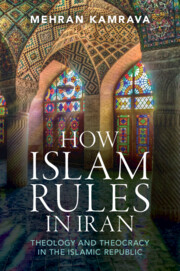
-
Select format
-
- Publisher:
- Cambridge University Press
- Publication date:
- 02 May 2024
- 09 May 2024
- ISBN:
- 9781009460880
- 9781009460835
- 9781009460842
- Dimensions:
- (229 x 152 mm)
- Weight & Pages:
- 0.66kg, 366 Pages
- Dimensions:
- (229 x 152 mm)
- Weight & Pages:
- 0.55kg, 366 Pages
You may already have access via personal or institutional login
Book description
This study provides a comprehensive examination of the evolution of Islam as a ruling framework in postrevolutionary Iran up to the present day. Beginning with the position and structure of Iran's clerical establishment under the Islamic Republic, Kamrava delves into the jurisprudential debates that have shaped the country's political institutions and state policies. Kamrava draws on extensive fieldwork to examine various religious narratives that inform the basis of contemporary Iranian politics, also revealing the political salience of common practices and beliefs, such as religious guardianship and guidance, Islam as a source of social protection, the relationship between Islam and democracy, the sources of divine and popular legitimacy, and the theoretical justifications for religious authoritarianism. Providing access to many Persian-language sources for the first time, Kamrava shows how religious intellectual production in Iran has impacted the ongoing transformation of Iranian Shi'ism and ultimately underwritten the fate of the Islamic Republic.
Reviews
‘This book is well written and contains a useful analysis of what is happening in Iran today. … Recommended.’
G. M. Farr Source: CHOICE
Contents
Metrics
Altmetric attention score
Full text views
Full text views help Loading metrics...
Loading metrics...
* Views captured on Cambridge Core between #date#. This data will be updated every 24 hours.
Usage data cannot currently be displayed.
Accessibility standard: Unknown
Why this information is here
This section outlines the accessibility features of this content - including support for screen readers, full keyboard navigation and high-contrast display options. This may not be relevant for you.
Accessibility Information
Accessibility compliance for the PDF of this book is currently unknown and may be updated in the future.


